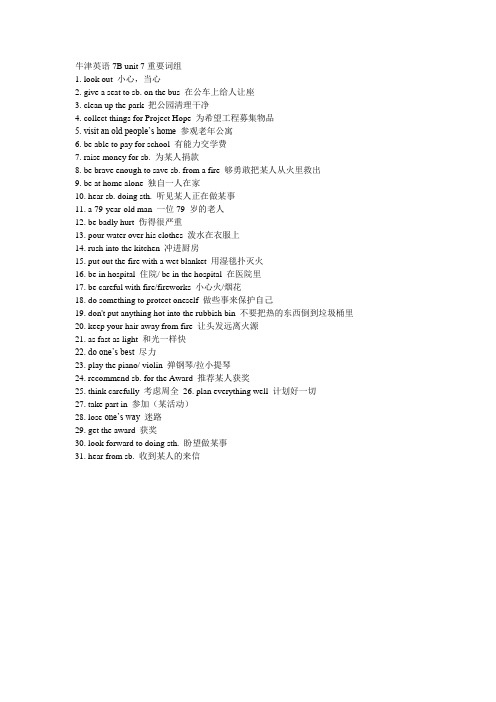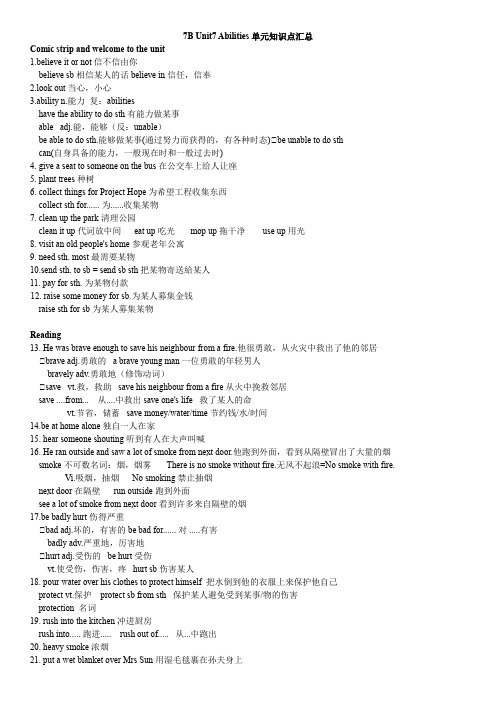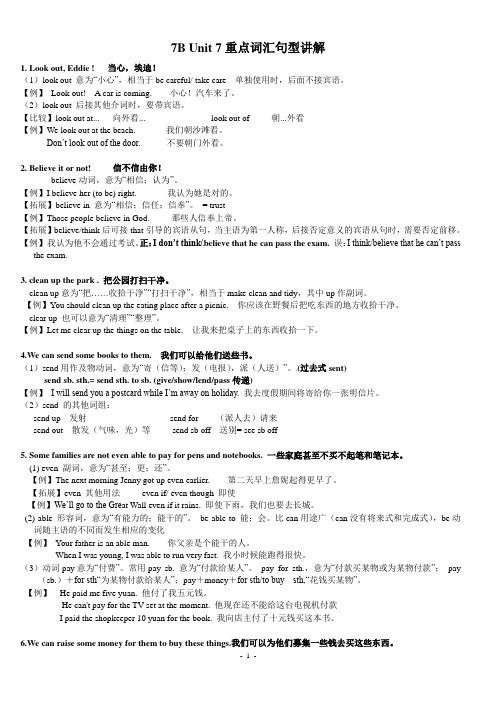7B U7知识点归纳
7B unit 7 重要词组 、句型归纳及翻译句子练习

牛津英语 7B unit 7 重要词组1. look out 小心,当心2. give a seat to sb. on the bus 在公车上给人让座3. clean up the park 把公园清理干净4. collect things for Project Hope 为希望工程募集物品5. visit an old people’s home 参观老年公寓6. be able to pay for school 有能力交学费7. raise money for sb. 为某人捐款8. be brave enough to save sb. from a fire 够勇敢把某人从火里救出9. be at home alone 独自一人在家10. hear sb. doing sth. 听见某人正在做某事11. a 79-year-old man 一位 79 岁的老人12. be badly hurt 伤得很严重13. pour water over his clothes 泼水在衣服上14. rush into the kitchen 冲进厨房15. put out the fire with a wet blanket 用湿毯扑灭火16. be in hospital 住院/ be in the hospital 在医院里17. be careful with fire/fireworks 小心火/烟花18. do something to protect oneself 做些事来保护自己19. don't put anything hot into the rubbish bin 不要把热的东西倒到垃圾桶里20. keep your hair away from fire 让头发远离火源21. as fast as light 和光一样快22. do one’s best 尽力23. play the piano/ violin 弹钢琴/拉小提琴24. recommend sb. for the Award 推荐某人获奖25. think carefully 考虑周全26. plan everything well 计划好一切27. take part in 参加(某活动)28. lose one’s way 迷路29. get the award 获奖30. look forward to doing sth. 盼望做某事31. hear from sb. 收到某人的来信7B Unit 7重点词组归纳1.小心look out2.植树plant trees3.清扫公园clean up the park4.在公共汽车上给人让座give a seat to someone on the bus 5参观老年之家. visit an old people’s home6. 为希望工程收集募捐东西collect things for project hope7. 贫困地区的孩子the children in poor areas8. 能够be able to9. 支付pay for10. 冲进 rush into11. 浓烟 heavy smoke12. 帮助…摆脱困难help…out13. 在医院in hospital14. 想想 think about15. 使…停止燃烧stop something from burning16. 顺便by the way17. 在学校演出上弹钢琴play the piano at school shows18. 其余的人the rest of them19. 拉小提琴play the violin20. 在六岁时at the age of six21. 一个有用的地方a useful place1. look out2. plant trees3. clean up the park4. give a seat to someone on the bus5. visit an old people’s home6. collect things for project hope7. the children in poor areas8. be able to9. pay for10. rush into11. heavy smoke12. help out13. in hospital14. think about15. stop something from burning16. by the way17. play the piano at school shows18. the rest of them19. play the violin20. at the age of six21. a useful place7B Unit 7重点句归纳1. Believe it or not! 信不信由你! (80)2. They need clothes and shoes most. 他们最需要衣服和鞋子。
译林版7Bunit7知识点讲解+练习

Unit 7 abilities一、重要句型1.believe it or not . 信不信由你believe sb 相信某人believe in sb =trust sb 信任某人2.look out =Be careful 当心look out for sth =be careful with sth 当心某物3.I can fly =I am able to fly =I have the ability to fly. 我能飞.(指某一种能力)sb can do sth =sb be able to do sth =sb has/have the ability to do sth 某人有能力做某事。
4.give a seat to someone on the bus 在公交车上给人让座。
collect things for Project Hope。
为希望工程收集东西。
give a seat to sb =give sb a seat 给某人让座。
collect sth for……为……收集某物5.How cool!多么酷!what a brave young man!多么勇敢的年轻人!How brave you are!你是多么勇敢啊!感叹句句式是由how 和what构成。
how +adj/adv+主语+谓语动词!what a/an+(adj)+可单+主语+谓语动词!what +(adj)+可数/不可数+主语+谓语动词!判断感叹句用how和what的步骤:1.先找出句子中的主语+谓语动词(括号起来不看)2.看剩下的部分是否有名词,有的话用what,无的话用how。
6.put out the fire 扑灭火put off 推迟put up 举起,张贴搭建put in 安装put on 穿上7. I didn’t have time to think about it。
我没有时间去考虑它。
7B Unit7 Abilities单元知识点汇总

7B Unit7 Abilities单元知识点汇总Comic strip and welcome to the unit1.believe it or not信不信由你believe sb相信某人的话believe in信任,信奉2.look out当心,小心3.ability n.能力复:abilitieshave the ability to do sth有能力做某事able adj.能,能够(反:unable)be able to do sth.能够做某事(通过努力而获得的,有各种时态)➡be unable to do sthcan(自身具备的能力,一般现在时和一般过去时)4.give a seat to someone on the bus在公交车上给人让座5.plant trees种树6.collect things for Project Hope为希望工程收集东西collect sth for......为......收集某物7.clean up the park清理公园clean it up代词放中间eat up吃光mop up拖干净use up用光8.visit an old people's home参观老年公寓9.need sth. most最需要某物10.send sth. to sb= send sb sth把某物寄送給某人11.pay for sth.为某物付款12.raise some money for sb.为某人募集金钱raise sth for sb为某人募集某物Reading13.He was brave enough to save his neighbour from a fire.他很勇敢,从火灾中救出了他的邻居➡brave adj.勇敢的 a brave young man一位勇敢的年轻男人bravely adv.勇敢地(修饰动词)➡save vt.救,救助save his neighbour from a fire从火中挽救邻居save ....from... 从....中救出save one's life 救了某人的命vt.节省,储蓄save money/water/time节约钱/水/时间14.be at home alone独自一人在家15.hear someone shouting听到有人在大声叫喊16.He ran outside and saw a lot of smoke from next door.他跑到外面,看到从隔壁冒出了大量的烟smoke不可数名词:烟,烟雾There is no smoke without fire.无风不起浪=No smoke with fire.Vi.吸烟,抽烟No smoking禁止抽烟next door在隔壁run outside跑到外面see a lot of smoke from next door看到许多来自隔壁的烟17.be badly hurt伤得严重➡bad adj.坏的,有害的be bad for......对.....有害badly adv.严重地,厉害地➡hurt adj.受伤的be hurt受伤vt.使受伤,伤害,疼hurt sb伤害某人18.pour water over his clothes to protect himself把水倒到他的衣服上来保护他自己protect vt.保护protect sb from sth保护某人避免受到某事/物的伤害protection 名词19.rush into the kitchen冲进厨房rush into.....跑进.....rush out of..... 从...中跑出20.heavy smoke浓烟21.put a wet blanket over Mrs Sun用湿毛毯裹在孙夫身上22.help her out帮助地出来help sb out帮助某人摆脱困境23.put out the fire扑灭火put out扑灭24.burn one's arms烧伤了某人的胳膊burn-burned/burnt25.be in hospital for two weeks住院两周in hospital住院in the hospital在医院里26.at that moment= just then就在那时27.have time to think about sth.有时间思考某事28.nod vi.点头过去式:nodded 现在分词:nodding29.be careful with sth.小心某物be careful with fireworks当心烟花care vt.关心careful adj.仔细的,认真的,小心的careless --be careless粗心carefully adv.细心地,认真地,小心地30.stop sb. from doing sth.阻止某人做菜事31.hear about the news听说这个新闻news不可数名词:消息,新闻 a piece of news一则新闻No news is good news.没消息就是好消息32.Sth be on fire= sth catch a fire着火33.play with matches玩火柴match n.(可数)火柴/比赛vt.相配match sth well与....很配34.keep your hair from the fire使你的头发远离火keep sb. away from sth.使某人远离某物Grammar35.make a call on your mobile用你的手机打个电话36.leave sth. at home把某物落(忘)在家37.burn things with his eyes用他的眼睛烧东西38.hear things far away听到远处的东西39.What else can he do?他还能做什么?else adv.另外,其他通常放在特殊疑问词what/ who /which /when /where/ how等后面,或者放在something/ anything /nothing /anyone/ everyone等不定代词后other adj.其他的,别的后接名词40.fly as fast as light飞得像光一祥快41.情态动词➡定义:情态动词是一类用于表示说话人的语气和情态的助动词。
(译林版)7B-Unit7语法知识点

(译林版)7B-Unit7语法知识点(译林版)7B-Unit7 语法知识点本文档将介绍(译林版)7B-Unit7中的语法知识点。
1. 形容词和副词的比较级和最高级形容词和副词的比较级和最高级用于对两个或多个人或事物进行比较,并表达大小、高低、快慢等概念。
比较级的构成方法:1. 一般在形容词或副词后面加上-er,如taller,faster。
2. 以字母e结尾的形容词或副词,直接加-r,如nicer,larger。
3. 以辅音字母+y结尾的形容词或副词,将y变为i,再加-er,如busier。
4. 多音节和部分双音节形容词或副词在前面加more,如more interesting,more quickly。
最高级的构成方法:1. 一般在形容词或副词前面加上the,再在后面加上-est,如the tallest,the fastest。
2. 以字母e结尾的形容词或副词,直接加-st,如the nicest,the largest。
3. 以辅音字母+y结尾的形容词或副词,将y变为i,再加-est,如the busiest。
4. 多音节和部分双音节形容词或副词在前面加the most,如the most interesting,the most quickly。
2. 一般过去时一般过去时用于表示过去发生的动作或存在的状态。
构成方法:1. 对于大多数动词,在动词原形后面加上-ed,如worked,played。
2. 以e结尾的动词,直接加-d,如lived。
3. 以辅音字母+y结尾的动词,将y变为i,再加-ed,如studied。
特殊情况:1. 以辅音字母+y结尾的动词,如果在末尾前有一个元音字母,则直接加-ed,如stayed。
2. 以辅音字母+ie结尾的动词,将ie变为y,再加-ed,如cried。
3. 一般将来时一般将来时用于表示将来发生的动作或存在的状态。
构成方法:1. 对于大多数动词,在动词原形前面加上will,如will work,will play。
新7B unit 7各模块所有知识点

Unit 7COMIC and WELCOME:1.fly to Beijing = go to Beijing by plane乘飞机去北京2.believe it or not信不信由你3.look out = be careful with当心4.What can you do for ....?你能为....做什么?5.Helping Hands Club援助之手俱乐部a member of ..., .....的一成员6. the members of ....,....的成员7.I'm a member of the Helping Hands Club .= I'm in the Helping Hands Club .我是援助之手俱乐部的一员8.plant trees植树9.give a seat to sb = give sb a seat 给某人让座10.collect sth for sb为某人收集某物11.help an old man帮助老人12.clean up the park 清扫公园13.visit an old people's home访问老人之家14.the children in poor areas 贫困地区的孩子15.need ...most 最需要.......16.send sth to sb = send sb sth 送某物给某人17.be able to do sth = can do sth 能做某事18.pay for ....附.....的款19.raise some money for sb 为某人募些钱20.buy these things买这些东西READING:21.a brave young man 一个勇敢的年轻人22.read a newspaper article about ....=read an article about in the newspaper读报纸上有关....的文章23.be +adj.+enough to do sth (与转换so ....that ....)足够.....做某事24.save sb from a fire 把某人从火中救出来25.on 10 May 在五月十号26.be / stay at home alone = be / stay at home by oneself 独自一人待在家27.hear / see / notice / watch sb doing sth 听到/看到/注意到/观看某人正在做某事(一次性)28.hear / see / notice / watch sb do sth听到/看到/注意到/观看某人做某事(经常性)29.run outside跑出去30.see a lot of smoke from ....看到许多烟雾从.....冒出来31.find sb / sth in the kitchen发现某人某物在厨房里32.heavy smoke浓烟33.be badly hurt伤的严重34.get out 出去35.get out of ...从....出去36.ran to .....,跑到......37.run towards .... ,跑向......38.pour water over ....,把水浇在.....上39.protect oneself 保护自己40.rush into ....,冲进41.put a wet blanket over sb / sth用潮湿的毯子包住某人或某物42.help sb out 帮助某人摆脱困境43.be / stay in hospital for 2 months 住院两月44.many people许多人45.visit sb / sp拜访某人/参观某地46.give sb sth = give sth to sb 给某人某物47.at that moment = at that time 在那时48.be a little afraid of ...有点害怕.....49.be afraid of doing sth = be afraid to do sth害怕做某事50.have time to do sth 有时间做某事51.have no time to do sth= do not have time to do sth 没时间做某事52.think about .....,考虑......53.think of ...,想到......54.need one's help需要某人的帮助55.It's dangerous to do sth .做某事是危险的。
最新江苏新版牛津英语7B-Unit-7-知识点

精品文档ShoppingUnit 7 Comic stripPart One重点全解(P 80)Believe it or not. 1、believe it or not意为“信不信由你”,是由whether you believe it or not变化而来,通常置于句首,后面加逗号,再接主句。
例如:Believe it or not, I heard from Xie Na.2、Look out, Eddie.(P 80)look out意为“留神;当心,小心”,多用于口语中,用来提醒人们注意当前的危险状态或不安全的场所及事物等,与be careful意思相近。
例如:Look out! The car is coming.3、People have different abilities.(P 80)ability此处用作可数名词,意为“能力”,形容词是able,意为“有能力的”。
①表示抽象意义的“能力”,为不可数名词。
例如:He is a man of ability.②表示不同种类的能力时,为可数名词,可用复数形式。
例如:Different people have different abilities.③侧重指智慧、天资、天分等方面的意义时,可数或不可数均可,有时还可用复数形式。
例如:The girl has a great musical ability. Everyone admired his abilities.④表示有能力做某事或具有做某事的能力等,其后通常要接动词不定式。
例如:I think Kitty has the ability to be our monitor.Part Two Welcome to the unitB重点全解1、We can send some to them.(P 81)send及物动词,意为“邮寄,发送,派遣”。
send sth to sb=send sb sth,意为“把某物寄给某人”,但当send后表示的词是代词时,只能用send sth to sb形式,而不能用send sb sth形式。
2023年新版译林7Bunit7知识点整理

Unit 7 Abilities一、重点词汇ability n. 能力believe vi. 相信seat n. 座位send vt. 送;邮寄;派遣notebook n. 笔记本even adv. 甚至able adj. 能,可以pay vt. 付钱;给...酬劳raise vt. 筹集brave adj. 勇敢旳save vt. 救,救济smoke n. 烟,烟雾vt.吸烟badly adv. 严重地,厉害地hurt vi.&vt. 使受伤,伤害;疼adj.受伤旳could modal v. (can 旳过去式) 可以,能,会pour vt. 倾倒project vt. 保护rush vi. 冲,奔wet adj. 湿旳blanket n. 毯子burn vt.&n. 烧伤,燃烧moment n. 半晌;瞬间nod vt.&vi. 点头careful adj. 仔细旳,认真旳,小心旳reporter n. 记者news n. 新闻,消息newspaper n. 报纸match n. 火柴rubbish n. 垃圾,废弃物bin n. 垃圾箱recommend vt. 推荐madam n. 女士,夫人till prep.&conj. 到...时,直到...为止camera n. 摄影机X-ray n. X光,X射线term n. 学期article n. 文章careless adj. 粗心旳piano n. 钢琴violin n. 小提琴sir n. 先生award n. 奖;奖品;奖金vt. 授予,奖励part n. 部分lose vt. 迷失;丢失;失去look out 留神;当心plant trees 植树help an old man 协助老人clean up 收拾洁净give a seat to someone 将座位让给某人collect things for 为...搜集东西Project Hope 但愿工程an old people’s home 养老院in poor areas 在贫困地区send some books to sb 送书给...pay for 为...付款different abilities 不一样旳能力be able to 能,会raise some money for 为...捐款give awards to 给...颁奖recommend someone for an award 推荐某人获奖recommendation letter 推荐信the Helping Hands Club 帮手俱乐部brave enough 足够勇敢save...from 从...中救出hear someone doing 听到某人正在做... run outside 跑出去a lot of smoke 大量旳烟next door 在隔壁the 79-year-old Mrs Sun 79岁旳孙奶奶be badly hurt 伤得很重pour water over 把水倒在...上面rush into 冲进去heavy smoke 浓烟put out the fire 灭火a wet blanket 一条湿毯子be in hospital 住院give sb flowers and presents 给某人花和礼品at that moment 在那时think about 考虑,思索be careful with 小心... call for help 呼喊讨教sound dangerous 听起来危险play with 玩ride a horse 骑马 a good place to have fun 娱乐旳好地方make a call 打电话leave...at home 将...忘在家中no problem 没问题by the way 顺便问一下,顺便说说need to read more and speak more 需要多读多说work hard on 在...努力be careless 粗心do/try one’s best 尽某人最大努力do well in 在...做得好at the age of 在...岁时show sb how to do sth 指点某人怎样做某事English-Chinese Dictionary 英中文典recommend sb for 推荐某人做...Young Star Award 青年明星奖think carefully 仔细考虑plan everything well 一切计划得好take part in 参与in need 需要 a five-year-old boy 一种五岁旳男孩lose one’s way 迷路look forward to 期望hear from 收到...旳来信二、重点句型1. Look out, Eddie ! 当心,埃迪!(1)look out 意为“小心”,相称于be careful. 单独使用时,背面不接宾语。
7B Unit 7重点词汇句型讲解

7B Unit 7重点词汇句型讲解1. Look out, Eddie ! 当心,埃迪!(1)look out 意为“小心”,相当于be careful/ take care 单独使用时,后面不接宾语。
【例】Look out! A car is coming. 小心!汽车来了。
(2)look out 后接其他介词时,要带宾语。
【比较】look out at... 向外看... look out of 朝...外看【例】We look out at the beach. 我们朝沙滩看。
Don’t look out of the door. 不要朝门外看。
2. Believe it or not! 信不信由你!believe动词,意为“相信;认为”。
【例】I believe her (to be) right. 我认为她是对的。
【拓展】believe in 意为“相信;信任;信奉”。
= trust【例】Those people believe in God. 那些人信奉上帝。
【拓展】believe/think后可接that引导的宾语从句,当主语为第一人称,后接否定意义的宾语从句时,需要否定前移。
【例】我认为他不会通过考试。
正:I don’t think/believe that he can pass the exam.误:I think/believe that he can’t pass the exam.3. clean up the park . 把公园打扫干净。
clean up意为“把……收拾干净”“打扫干净”,相当于make clean and tidy,其中up作副词。
【例】You should clean up the eating place after a picnic.你应该在野餐后把吃东西的地方收拾干净。
clear up 也可以意为“清理”“整理”。
【例】Let me clear up the things on the table. 让我来把桌子上的东西收拾一下。
- 1、下载文档前请自行甄别文档内容的完整性,平台不提供额外的编辑、内容补充、找答案等附加服务。
- 2、"仅部分预览"的文档,不可在线预览部分如存在完整性等问题,可反馈申请退款(可完整预览的文档不适用该条件!)。
- 3、如文档侵犯您的权益,请联系客服反馈,我们会尽快为您处理(人工客服工作时间:9:00-18:30)。
Unit 7 Abilities1、Look out, Eddie! 当心,埃迪!(1)look out意为“向外看;小心”,相当于be careful。
单独使用时,后面不接宾语。
如:Look out! A car is coming. 小心!汽车来了。
(2)look out后接其他介词时,要带宾语。
如:look out at . . . 向外看……We look out at the beach. 我们进沙滩看。
look out of 朝……外看Don’t look out of the door. 不要朝门外看。
2、(1I believe her (to do) right. 我认为(2如:Those people believe in God. 那3、We can send some books to them. 我们可以给他们送些书。
send用作及物动词,意为“寄(信等);发(电报);(派人)送”。
如:I will send you a postcard while I’m away on holiday. 我去度假期间将寄给你一张明信片。
①send up 发射②send for (派人去)请来③send out 散发(气味、光等)④send sb off(=see sb off)送别4、Some children are not even able to pay for school. 一些孩子甚至不能付上学的钱。
(1)even副词,意为“甚至;更;还”。
如:The next morning Jenny got up even earlier. 第二天早上詹妮起得更早。
[拓展]even if /even though 即使We’ll go to the Great Wall even if it rains. 即使下雨,我们也要去长城。
(2)able形容词,意为“有能力的;能干的”。
如:Your father is an able man. 你父亲是个能干的人。
[拓展]be able to 能;会When I was young, I was able to run very fast. 我小时候能跑得很快。
5、He was brave enough to save his neighbour from a fire.他足够勇敢将他的邻居从火中救了出来。
save 动词,意为“救;求助”,save . . . from意为“从……中救出……”。
The doctor saved her life. 那个医生救了她的命。
Mr Zhang saved the boy from the river last Sunday. 上星期天张先生将那个男孩从河中救了出来。
6、Suddenly he heard someone shouting “Fire! Fire!”忽然他听到有人喊:“着火了!着火了!”hear sb doing sth表示“听见某人正在做某事”,强调动作发生的过程。
类似的还有see, find等动词。
如:I heard Lily singing in her room when I want to bed. 当我睡觉时,听见莉莉正在房间里唱歌。
7、He want in and saw his neighbour, the 79-year-old Mrs Sun, in the kitchen.他走进去,看见他79岁的邻居孙奶奶在厨房里。
79-year-old是一个合成的形容词。
year必须是单数,作定语,放在名词前面,意思中“……岁的”。
如:Do you know where the five-star hotel is? 你知道那家五星级的旅馆在哪里吗?8、He put out the fire with a wet blanket and helped Mrs Sun out.他用湿毯子把火扑灭,并把孙奶奶救了出去。
Put out 是“熄灭,扑灭”的意思。
如:Make sure to put out the gas. 务必把煤气关掉。
9、He was in hospital for two weeks. 他在医院住了两个星期。
In hospital意思是“生病住院”,而In the hospital意思为“在医院里”。
如:He goes to school from Monday to Saturday. 他周一至周六去学校上学。
Simon went to bed at 8:00 last night. 西蒙昨晚8点上床睡觉。
类似的结构还有:go to school去上学;go to the school去学校;at table坐下吃饭;at the table坐在桌子旁10、“Fire is very dangerous. We should be careful with it.”he also said. “火是危险的,我们应小心。
”他还说。
(1)be careful with意为“小心”,含“小心处理某物”的意思。
(2)each other是“互相同,彼此”的意思。
如:We must learn from each other. 我们必须互相学习。
11、Keep your hair away from fire. 头发要远离火。
词组keep . . . away表示“(使)不靠近或远离”的意思。
如:Keep the children away from the water. It’s dangerous. 不要让儿童靠近水。
危险!12、I’m afraid you can’t, but you may stay there till 5 pm if you want to . 恐怕你不能,但如果你想,你可以待在那儿直到下午五点。
(1)till作介词,意为“直到;直到……之时”。
如:I’ll wait here till you come back. 我将在这里等你回来。
(2)till作连词,意为“直到,直到……为止”。
如:People don’t know the value of health till they lose it.人们直到失去健康的时候才知道健康的可贵。
(3)not . . . till/until . . . 直到……才……。
如:She didn’t hear from her son till last Friday. 直到上星期五他才接到儿子的信。
13、She does not do her best this term. 这一学期她没有尽全力。
do one’s best意为“尽全力”,相当于try one’s best。
如:We will do/try our best to learn English well. 我们会尽全力学好英语。
14、When he is free, he often helps at the Helping Hands Club and does most of the computer work for the club. 当他有空时,他常常在帮手俱乐部帮忙解决大多数电脑问题。
most of 表示“大部分,大多数”,后接名词时,名词前要加the;后接人称代词时,人称代词要用宾格。
如:most of the books 大部分书most of the children 大多数学生15、We look forward to hearing from you soon. 我们期待很快收到你的来信。
(1)look forward to 意为“盼望,期盼”,to为介词,故接动词时应使用动词的ing 形式。
如:We are looking forward to seeing echo other soon. 我们期望着早点见到对方。
(2)hear from 意为“收到……的来信”,后接某人。
如:I heard from my daughter in New York yesterday. 我昨天收到了在纽约的女儿的来信。
三、核心语法I、情态动词can, could的用法(1)can的用法can表示某人具有某种能力,意思为“能,会”,也表示客观的可能性,是“能够,可能”的意思。
后接动词原形,适用于所有人称。
(2)could的用法could为can的过去式,表示“能,可以”,另外could可用来代替can,表示更为客气委婉的语气,用来提出要求。
II、感叹句的用法感叹句用来表示强烈的感情,能表达、愤怒、悲哀、惊奇、厌恶和赞赏等。
句末用感叹号“!”,读时用降调。
在口语中常用省略句,后面的主语和谓语往往省略,有时只用一个词或词组表达。
(1)以what开头的感叹句,what可数名词单数形式前要加不定冠词a(an)。
如:(2how作状语,修饰形容词、副词或动词。
如:(3)疑问句形式的感叹句:有些感叹句采用一般疑问句的形式表示,以否定词开头,在口语中读降调。
如:Isn’t if a lovely view? 多美的景色呀!。
